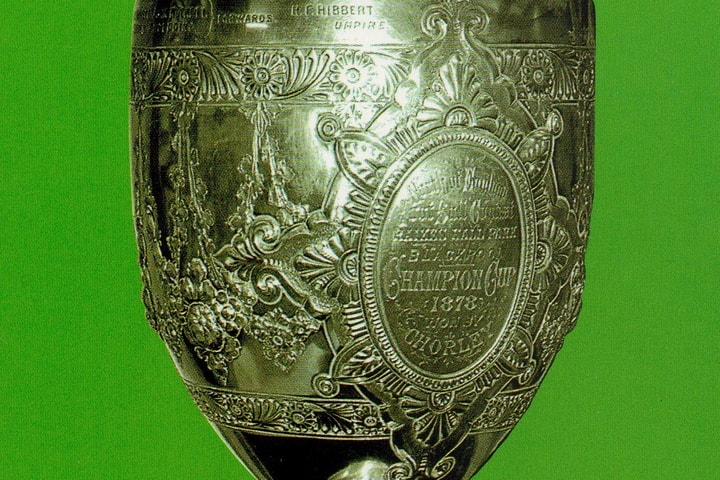Blackheath came back into the match and scored a try through
their forward William Mortimer after 30 minutes of play. This was
converted by Mitchell after which Dixon returned to the field to
great applause from the crowd. It was a 15-a-side match again.
Blackheath continued to press the Cambridge defence and their
twenty-one year old right winger, GC 'Tot' Robinson, scored a fine
try. Mitchell couldn't convert the try but Blackheath retained
their three-point lead up to half-time. Robinson had won two caps
for England earlier in the year while playing for Percy Park in
Northumberland and he had scored tries in both matches. He would
go on to become one of the finest wingers pre-World War One,
scoring eight tries in eight internationals between 1897 and 1901
including six tries in his first five internationals.
Cambridge attacked vigorously when the match restarted and their
efforts were crowned mid-way through the second half with a try by
their own right wing William Pilkington converted by Campbell to
give Cambridge a two-point lead. For the remainder of the game
Cambridge kept Blackheath pinned down near or in their '25' and the
right wing pair of Pilkington and Cumberlege were described as the
stars of the Cambridge team. Their efforts enabled Cambridge to
retain their slender lead and, despite some close calls, to end the
match as winners by 10 points to 8.
The 1897 varsity match was played at Queen's Club, Kensington
just a month later on 14 December in front of 6,297 spectators who
paid at the turnstiles. Just one Cambridge player from the match
against Blackheath was not selected for the varsity match. Sydney
Bell, half back in three of the four tests on the British tour to
South Africa in 1896 and captain of the Cambridge side in the
varsity match the previous year, had broken his collarbone in the
match against Cardiff on 1 December. He was replaced by the Scot
Maurice Black who played in both the 1897 and 1898 varsity matches
and, as a member of the Royal Flying Corps, died in an aerial
dogfight in the 1st World War in February 1917.
The consistency created by a largely unchanged side did not help
Cambridge in the 1897 varsity match. Oxford were captained by the
experienced Scotland full back Allan Smith, playing on the wing in
his fourth varsity match, and the Oxford pack was regarded by the
pundits as being strong and mobile. Cambridge managed to keep
their line intact in the first half but their threequarters were
unable to create any scoring opportunities. Relentless pressure
finally told when Oxford crossed for two tries early in the second
half and they held on to win the match by 6 points to nil.
Sources:
- Blackheath Rugby Football Club Records 1875-1898 (Blackheath
RFC 1898)
- The Bowring Story of the Varsity Match - David Frost (Queen
Anne Press 1988)
- The Club - Life and times of Blackheath FC - Dave Hammond
(MacAitch Publisher 1999)
- Oxford v Cambridge - Howard Marshall (Clerke & Cockeran
1951)
- 150 Years of Cambridge University Rugby Football Club - Editor:
Rob Cole (Sporting Eric 2021)
- Newspapers: Cambridge Daily News - Sporting Life -
Sportsman








